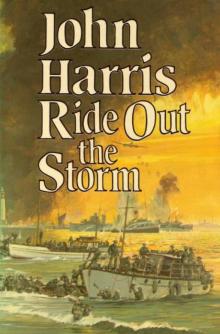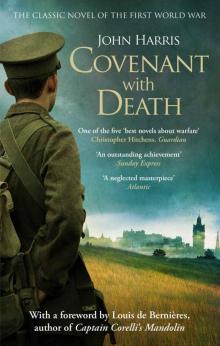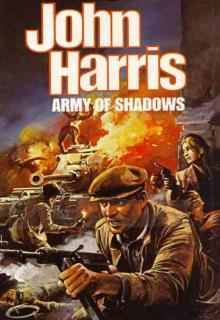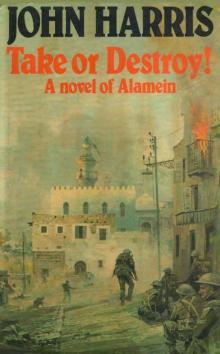- Home
- John Harris
Fox from His Lair Page 3
Fox from His Lair Read online
Page 3
‘I’m investigating the murder of a British officer,’ Pargeter went on. ‘A Captain Dunnaway. He seems to have had a lot of friends among your people. He was always with them.’
‘Yeah? What can I do?’
‘Probably nothing. Just making my number with you, that’s all. Mustn’t tread on any toes, y’know. Might have to ask for a little help.’
Iremonger looked quickly at the Englishman, suspecting a leg pull, but there was no hint of amusement on the solemn face and he noticed suddenly that, in spite of the narrow head, Pargeter’s face had unexpected sharp planes and angles and that there seemed to be a bursting energy about him.
‘I’m pretty goddam busy,’ he said. ‘Involved with the invasion.’
‘Pretty busy myself,’ Pargeter pointed out mildly. ‘And I’m involved with the invasion, too.’
‘I thought you said murder.’
Pargeter blinked. ‘At the moment we’re wondering if the feller was a homosexual. You’ll be aware that homosexuals are always pretty tricky. Chatter too much and all that. Lay themselves open to blackmail.’
‘I know that,’ Iremonger growled. ‘I was a policeman before I got into this outfit.’
‘So I heard.’ Pargeter blinked. ‘The general told me. He also told me what you were doing and why you weren’t in the office when I first called.’
It seemed to Iremonger that the general was a bit too quick to shoot off his mouth.
‘How many have you found?’ Pargeter asked.
‘More than half. Around four hundred.’
‘I meant Bigot officers.’
Iremonger scowled. ‘Nine, now,’ he said. ‘Why?’
Pargeter blinked. ‘Occurred to me that our friend, Captain Dunnaway, might have been blackmailed into passing on information. If he was a homosexual, that is, and if he had any information.’
‘About Exercise Tiger?’
‘Hadn’t it occurred to you, Colonel?’
Iremonger hadn’t so far linked the dead British officer with the disaster on Slapton Sands but he was quick to cover up. ‘Yeah,’ he said. ‘It had occurred to me.’
Pargeter gave him a smile and, despite his instinctive dislike for anything British, Iremonger found himself dazzled by it. It had such a special quality of charm, he even wondered if Pargeter practised it in front of a mirror, to get things he wanted.
‘How did it happen?’
Iremonger scowled and, reaching for a file, handed over a sheet of paper and started to read from the folder ‘“Troops embarked for final rehearsals,”’ he began, ‘“from the same ports as for the invasion. On the night of April 26–27, they proceeded through Lyme Bay with the minecraft sweeping ahead of them as if crossing the Channel. Commander-in-chief, Plymouth, threw patrols across the mouth of Lyme Bay consisting of two destroyers, three MTBs and two MGBs. Following a mock bombardment, landings were made during the morning of the 27th and unloading continued through the day and a follow-up of eight LSTs was expected at night.”’
Iremonger paused in his reading to draw breath. ‘“When that second convoy was manoeuvring in Lyme Bay about midnight,”’ he went on, ‘“with one escort vessel only, HMS Azalea, the other having been damaged and returned to base, flares were seen. It was supposed at first that they were part of the exercise; but at about 0130 on the morning of April 28, gunfire broke out astern and all vessels went to general quarters. We were being attacked by ten German E-boats out of Cherbourg, which had slipped past the naval patrols without being recognised. At 0204, LST 507 was struck by a torpedo, all electric power failed and it burst into flames. When the fire got out of control, the survivors abandoned ship. A few minutes later, LST 531 was hit by two torpedoes, burst into flames and, within six minutes, rolled over and sank. At 0228, LST 289 opened fire on an E-boat, which retaliated with a torpedo hit. A dozen men were killed but the LST managed to make port under her own power. For about half an hour the five landing ships remaining afloat exchanged fire with the E-boats which were also engaged by the British destroyer. All but one escaped by the use of smoke and high speed. One – numbered 151 – was hit and blew up. HMS Azalea picked up one survivor.”’
Iremonger paused. ‘I was aboard HMS Azalea,’ he said.
Pargeter sat staring at his feet for a while as Iremonger finished. ‘Nasty,’ he commented.
Iremonger scowled. He had long since privately laid the blame at the door of the Royal Navy. In his heart of hearts, he wasn’t sure that he was being fair, but he was a headlong man and he didn’t often stop to think of fairness.
‘Somebody slip up?’
‘Christ knows,’ Iremonger said. ‘Mebbe someone was depending too much on radar while the Krauts were using Mark I eyeballs, and when one of the destroyers had to turn back with engine trouble, it wasn’t thought necessary to replace it.’ He scowled. ‘We’ve identified the Germans – they came from the 5th and 9th E-boat flotillas at Cherbourg.’ He indicated the paper he’d passed over. ‘You have the casualty figures there. Most of ’em came from the 4th Combat Engineer Battalion and they’re going to be missed when we land in France.’
As Iremonger became silent, there was a knock on the door and Sergeant Weinberger put his head round.
‘Number ten’s turned up, Colonel,’ he said. ‘A Polish unit with the British Second Army east of Lyme were brought in to help and they’ve just reported it.
‘Is it complete?’ Iremonger asked. ‘Papers there?’
‘Far as I can make out, sir. I told them they weren’t to touch a goddam thing. They said they hadn’t. It’s at the Weymouth end of the bay and there’ll be a jeep-load of Snowdrops waiting outside Lyme Regis to guide us to it when we arrive. They’re fixing lights, screens, and all the necessary vehicles.’
Iremonger gave a sigh of relief. ‘Well, thank God for that,’ he said. ‘Tell ’em in the office to inform the general. He’ll want to know. Then have the jeep brought round. I’m going over there.’
As the sergeant’s head disappeared, Pargeter reached for his cap and walking stick. ‘Mind if I come, too?’ he asked.
Iremonger minded very much, but he remembered the general’s warning. ‘I guess I can’t stop you, buster,’ he said ungraciously.
Four
It was a difficult drive to Lyme Regis, less because of the distance than because of the number of vehicles on the narrow roads.
The whole coastal area seethed with shipping and, as it grew dark, they could see the little shipyards along the creeks, many of them new, bristling with the naked struts and ribs of vessels. Ships even grew in the streets and workshops, prefabricated parts being hurriedly put together round steel skeletons, so that shipbuilding had almost become a cottage industry.
Sitting in the back of a jeep driven by Sergeant Weinberger at a lunatic speed between the convoys of lorries, Pargeter stared around him, a frown of irritation on his neat features. First there had been the Czechs, the Poles, the French, the Dutch and the Norwegians, and the British had grown used to them all in time, but now indignity had been heaped on them until they had reached breaking point. There were now a million and a half Americans to bear them down with their weight, and to guard the secrets of the invasion the last straws had been loaded on to British backs with the restriction of the postal services and the sealing off of the southern coastal areas. As it happened, only doctors and those on essential business had been able to move for some time anyway. With petrol cut to nothing, the only transport available was a bicycle or one’s own two feet, and no one wanted to use those with the roads death traps under the endless convoys moving about at breakneck speed. Houses in the narrow villages of the west shuddered as they went past, sometimes knocking off the corner of a building or killing a dog, sometimes even an unwary child; and to make movement easier, the Americans had even hacked away the corners of the winding lanes that Pargeter loved so much. This was his corner of England and it annoyed him that a set of foreigners, with no intention of enduring England for one minute longer th
an they could help after the war was won, should destroy its beauty so that they could travel at their usual frantic pace.
Aware of Iremonger’s disapproval of him, he tried to make conversation.
‘Been a good spring,’ he said.
‘Yeah.’
It was hardly an encouragement and he fell back once more on his own thoughts, glancing upwards as a flight of aeroplanes appeared suddenly over the hills to his left and hurtled towards the sea. The skies had not been quiet for months. Kent, Sussex, Hampshire, Dorset, Devon and Cornwall were crowded with lorries, tank transporters and bulldozers, all heading south or south-west to the ports. So many streets had become one-way in the little towns that employers were having to give their workers an extra quarter of an hour to get home for lunch, and work in schools had to stop because of the noise of tanks grinding up hills. Practising American troops assaulted the same hills again and again, and in every sandy combe mines and bombs erupted in spouts of black smoke, flame and sand as men leapt from their assault craft. Everything was assembled to simulate reality except death.
A convoy began to pass in the opposite direction, tyres whining on the tarmacadam, each vehicle giving a breathy ‘whoosh’ as it disappeared. They were filled with American servicemen, all waving and yelling at the females on the pavements, whether they were thirteen, middle-aged or pushing prams. If the invasion didn’t come soon, Pargeter thought, Great Britain would sink with the weight of people crammed into it, and, without doubt, the south would be the first to go under. Warehouses overflowed and all double-track roads had had one track closed so that it could be packed with lorries, tanks, cars, jeeps and guns. From the coast where huts and tented camps dotted the fields, the supply and service tails stretched back as far as the Midlands. Hundreds of private properties, farmlands, even whole villages, had been taken over despite the legal difficulties. Everything had been pushed aside, the law as easily as red tape, for the sole end of the coming invasion.
He became aware of Iremonger’s scowl and tried again. ‘Amazin’,’ he offered, ‘that Jerry’s never seen any of all this.’
Iremonger grunted. ‘The day the Krauts get past our air force,’ he said, ‘will be a gala day.’
‘Our air force, too,’ Pargeter reminded him quietly, deciding he didn’t like Iremonger very much. ‘They had a bit to do with winding up the Luftwaffe.’
They passed through Exeter as it began to grow dark, then out by the coast road towards Sidmouth, Beer and Seaton. As they roared down the hill into Lyme, a jeep with four American MPs was waiting for them. As Sergeant Weinberger drew to a stop, a corporal climbed out.
‘Hi, Colonel,’ he said. ‘Glad to meet you.’
The police jeep led the way towards Bridport where it turned right. After a while the road became narrower and, beyond Abbotsbury, as they turned right once more, finally ceased to be tarmacadamed. Eventually, bumping over the rough surface of a farm lane, they came to a gate. Beyond was utter blackness. The jeep stopped and the police corporal appeared alongside Iremonger.
‘Guess we walk from here, Colonel,’ he said.
As they climbed out, Iremonger noticed an ambulance and a black police van in the shadows under the trees. The road to the beach was steep and uneven and they stumbled in the darkness with only their torches to guide them. Over to the east they could hear the rumble of aircraft and the distant thud of bombs and see the weaving fingers of searchlights behind the dark shadow of the Downs.
‘Portland Bill,’ the corporal said. ‘After the landing craft, I guess.’
The road to the beach grew more difficult as it grew more steep, but at last they dropped the final few feet to a stretch of sand and shingle and followed the corporal to where they could see a faint light in the distance under the loom of the cliffs. There were two policemen, a Provost lieutenant and a few soldiers with rifles. As they came to a stop, someone turned up a gas lamp.
‘Make it quick, Colonel, if you can,’ one of the policemen said. ‘We wouldn’t like to attract some prowling night fighter.’
The body was lying on its back, sand in its open mouth and on its eyeballs, its skin the colour of putty. One hand clutched papers in stiff fingers.
‘This how he was found?’ Iremonger asked.
‘That’s what I understand, sir,’ the Provost lieutenant said. ‘When we arrived there was a Polish officer who’d been fetched by one of his men, the guy who found him.’
‘Where is he now?’
‘He’s gone, sir. I understood that this – whatever it is – was to be kept quiet.’
Iremonger nodded and bent over the dead man. He was a lieutenant-colonel and, oddly enough, he still wore glasses, gold-rimmed ones that had slipped down his grey, sanded nose. Weinberger cut off his identity discs.
‘Colonel Greeno, Harry, sir,’ he announced, glancing at a list in his hand. ‘And that’s the last, so I guess we can now all go home.’
‘Amen to that.’ Iremonger eased the bundle of papers from the stiff fingers and glanced at them briefly. ‘Must have been trying to get rid of them when he went down for the last time,’ he said.
They saw the body carried up the hill towards the police van; then the canvas screen which had circled it was folded up and taken away. As the vehicles began to move down the lane towards the main road, the Provost lieutenant suggested that he find them a meal and Iremonger agreed.
‘Thanks,’ he said. ‘It’s going to be late when we get back.’
The Provost lieutenant had his headquarters in Charmouth and when they arrived a sergeant looked up. ‘Lieutenant, sir,’ he said. ‘Would that be Colonel Iremonger with you?’
‘Yeah,’ Iremonger said. ‘It would. Why?’
‘Nothing, Colonel. It’s not you I want. Would there be a Major Pargeter with you, sir? A British officer, sir? I was told there would be. There’s a message for him. It seems they’ve been trying to contact him since early this evening.’
As Pargeter pushed forward, the sergeant handed him a slip of paper. ‘You’re to ring that number, Major,’ he said. ‘They didn’t leave no name.’
Pargeter glanced at the number. ‘No,’ he said. ‘Shouldn’t think they would.’
The sergeant pushed a telephone forward and, as Pargeter picked up the receiver, he turned a handle and nodded. As Pargeter asked for his number, they all became silent, waiting, listening, wondering what was going on.
‘Yes.’ Pargeter seemed to stiffen to attention, Iremonger noticed with disgust, as if he were speaking to a senior officer. ‘That’s right, sir. I’m still on the track of Dunnaway.’ The telephone crackled and his eyebrows shot up. ‘Where, sir? Right, I’ll go at once.’
He put the receiver down, rubbed his thin nose with the handle of his stick then turned to Iremonger and gave him his special smile.
‘Got to leave you, old boy,’ he said. ‘Fun and games seem to be hotting up. Another chap’s been done in. Essex this time. This chap was fond of Americans, too, it seems.’
Five
Essex seemed to be as cold as Devon and Dorset, with the wind coming strongly from the north.
To avoid delay, Pargeter persuaded an army supply barge to give him a lift across the Thames from Sheerness to Southend-on-Sea. A big ship lay near the shore and the sergeant in charge of the barge cocked a thumb at it.
‘Ammo for the invasion,’ he said laconically. ‘The civvies are scared as hell the Germans will bomb it. We keep telling ’em it’s not ammo but they don’t believe it.’ He grinned. ‘Neither would I.’
At the other side of the river Pargeter borrowed a car and a driver from an Intelligence unit and obtained directions. ‘First US Army Group’s up there,’ he was told. ‘Patton’s lot. Mind you don’t get trampled under foot.’
When Pargeter reached First Army Group’s area, however, it seemed a strangely nebulous outfit. The Canadian 2nd Infantry Division, whom he’d seen drilling in the fields of Kent, was supposed to be under its wing, too, yet the camps in Essex seemed virt
ually empty.
‘Old Blood and Guts was down checking everything,’ an American top sergeant in an almost deserted tented camp near Chelmsford informed him. ‘Complete with side guns and bull terrier. Your guy, Monty, was here, too.’
‘When?’
‘Tuesday, sir.’
Pargeter lifted an eyebrow, because on Tuesday Montgomery had been at a conference on security in Surrey which he’d attended himself.
‘Patton down here often?’ he asked.
‘Ain’t seen him myself sir. But I’m told he’s around a lot, visiting the camps.’
‘Which camps?’
‘All the camps.’
‘There don’t seem to be many men in them.’
The sergeant’s face was blank. ‘There ain’t, sir? I heard they was full of guys.’
There was a curious absence of willingness to assist but, despite this, Pargeter managed to find a detective inspector in Colchester who seemed to know a few facts. The murdered man was an Ordnance Corps lieutenant called Jacobson. He was a Jew but, this apart, seemed to have quite a few things in common with Captain Dunnaway, the man found in Portsmouth. Like Dunnaway, he seemed to be a lone wolf, with a job which allowed him to travel about the country. Based in Dover, he’d been sent to Essex to investigate missing ammunition but had then disappeared until found on the mud flats of West Mersea. The inspector had made a few preliminary enquiries and had discovered that like Dunnaway he had had a university background. He also had a knowledge of explosives and weapons, while, with a French mother and a father in the wine trade, he had spent enough of his life in Alsace to become a linguist.
‘Which languages?’ Pargeter asked, knowing roughly what the answer would be before it came.
‘French and, because Alsace was German until 1918, German and Dutch. He was looking for an American, I gather.’
‘Which American?’
‘No idea. But there are a lot here belonging to First United States Army Group. Under that chap Patton.’

 China Seas
China Seas The Mercenaries
The Mercenaries Road To The Coast
Road To The Coast The Thirty Days War
The Thirty Days War The Old Trade of Killing
The Old Trade of Killing Ride Out The Storm
Ride Out The Storm Corporal Cotton's Little War
Corporal Cotton's Little War Fox from His Lair
Fox from His Lair Paint The Rainbow
Paint The Rainbow Flawed Banner
Flawed Banner Covenant with Death
Covenant with Death So Far From God
So Far From God The Sea Shall Not Have Them
The Sea Shall Not Have Them The Cross of Lazzaro
The Cross of Lazzaro Smiling Willie and the Tiger
Smiling Willie and the Tiger Harkaway's Sixth Column
Harkaway's Sixth Column The Sleeping Mountain
The Sleeping Mountain The Claws of Mercy
The Claws of Mercy North Strike
North Strike Picture of Defeat
Picture of Defeat Army of Shadows
Army of Shadows Right of Reply
Right of Reply Getaway
Getaway The Lonely Voyage
The Lonely Voyage Take or Destroy!
Take or Destroy! The Backpacker
The Backpacker A Funny Place to Hold a War
A Funny Place to Hold a War Swordpoint (2011)
Swordpoint (2011) A Kind of Courage
A Kind of Courage